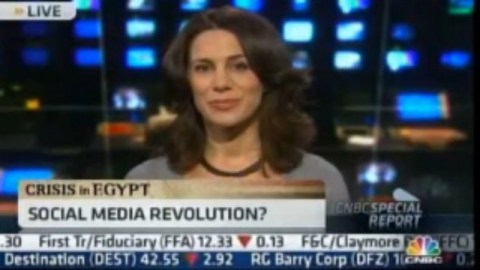A Revolution Has Not Been Televised: Viewers Are Misled When They Are Told Social Media Has Changed the Nature of Activism

In a guest post today, my colleague Paul D’Angelo, a professor of communication at The College of New Jersey, considers how the news media have defined the role of social media in the ongoing Egyptian uprising.–Matthew Nisbet
Social media have been an inescapable part of the political unrest sweeping throughout Egypt. It’s doubtful, for example, if as many people could have been mobilized so quickly for this past Friday’s protests without Facebook pages and Twitter posts. Social media are also a vital way the unrest is communicated to the rest of the world.
For example, as CNN World reported, journalists inside Egypt who could not get to dangerous places nonetheless followed tweets and blog entries, using them to report events to the world. And even when most of the web was shut down in Egypt, there were still tweets and photos flowing out of the country .
No doubt, it is important for news media around the world to cover the mobilizing and informing roles of social media in Egypt. Indeed, for many individuals who wish to experience social media’s roles in the crisis, coverage in the mainstream news media and their websites provides a useful point of entry.
Here in the U.S., though, the mainstream news media—cable and broadcast networks in particular—tend to lose sight of the real significance of social media in Egypt’s crisis. The real significance lies not in the fact that Egyptians are using social media as tools to organize protests and voice their discontent. Rather, because social media are “always on,” because there is ongoing, multimedia documentation of protest and discontent, the news media have a greater opportunity—indeed, an urgency and a duty—to focus on the myriad reasons for unrest.
So, the real significance of social media in Egypt lies in the way that the message is fused with the medium. Thoughtful and powerful narratives are those that blend the role of tweets, Facebook pages, blogs, and YouTube videos with economic and political hardships of Egyptians.
Those hardships are the reason why there are all of those tweets and Facebook pages and blogs and videos in the first place. In turn, these sorts of stories will serve to lessen the chance that the reasons for civil unrest can be ignored by the Mubarak government and heighten the chance that foreign governments allied to Mubarak can press for real change in Egypt.
The notion that publicity can engender accountability in the political sphere is not a new idea. But it is not publicity alone that induces accountability. The political revolution in Egypt should not be framed as a digital revolution. Correspondents at the scene, and network hosts and their guests back in newsrooms, tend to pitch events happening in Egypt—and in other parts of Africa and the Middle East—as if the tools of the digital age have changed the nature of social activism.
They haven’t.
Mainstream news seems to be teaching us that the harbinger to events in Egypt today was all of the blogs and YouTube videos that helped shape—and communicate—the 2009 civil unrest in Iran. They weren’t. Of course, there is a direct connection between these two momentous episodes. But that connection is not the whole story. Readers are misinformed, and even misled, when news media breathlessly proclaim that “the digital age has changed everything,” as does the CNN World piece referenced earlier.
We only have to look back at social movements before social media to see that the communications tools of social activism are not more important than the reasons social activists undertake civil unrest in the first place. The New Yorker’s Malcolm Gladwell brilliantly discusses how the 1960 lunch counter sit-down protests by black college students spread to various cities throughout the South.
Word-of-mouth and telephone calls were the social media that made these protests happen, sparking a civil rights war that engulfed the South throughout the decade. When the three television networks covered the inevitable clashes between protesters and police—particularly a few years later, during the Birmingham campaign—the whole country, and the Kennedy Administration, took notice.
Today’s coverage of the crisis in Egypt bears witness to the fact that social activists have always needed face-to-face and technologically mediated communication to organize and to make their voice heard. But the news media should not be infatuated with the digital means by which Egyptian protestors organize and communicate with each other. One even gets the sense that journalists confer legitimacy upon these protests owing to the technological savvy of the protestors.
Rather, if meaningful political change is going to occur—for President Mubarak, and President Obama, to really “hear” the protestors—then the news media are obligated to tell stories that connect the means of protesting with purpose of the protests. During America’s civil rights struggles, vivid and moving accounts of desperation and violence, aired on the nation’s newscasts, inevitably turned the narrative toward the disparity between the ordinarily peaceful protests and the violent and insufferably intolerant reactions to them.
In turn, the core message of civil rights movement—one of civil and human rights being denied to so many people in the world’s foremost democracy—shone through and catapulted change. Today’s coverage of the Egyptian crisis will be a force of positive change, as difficult as that change may be, when it sustains a narrative of an unstoppable movement that communicates an overdue and overpowering message.
–Guest post by Paul D’Angelo, Associate Professor of Communication at the College of New Jersey and co-editor of Doing News Framing Analysis: Empirical and Theoretical Perspectives.





